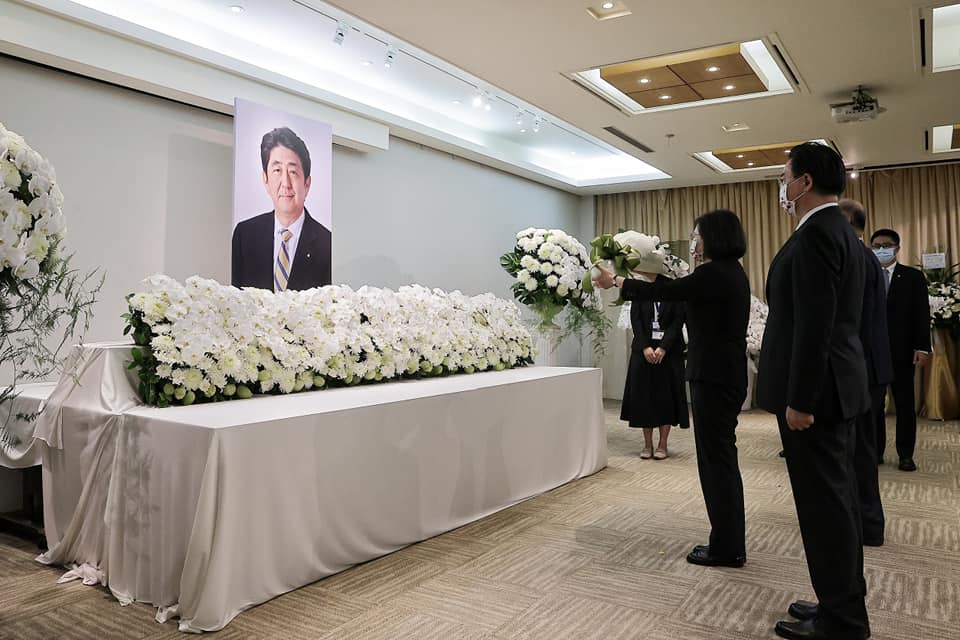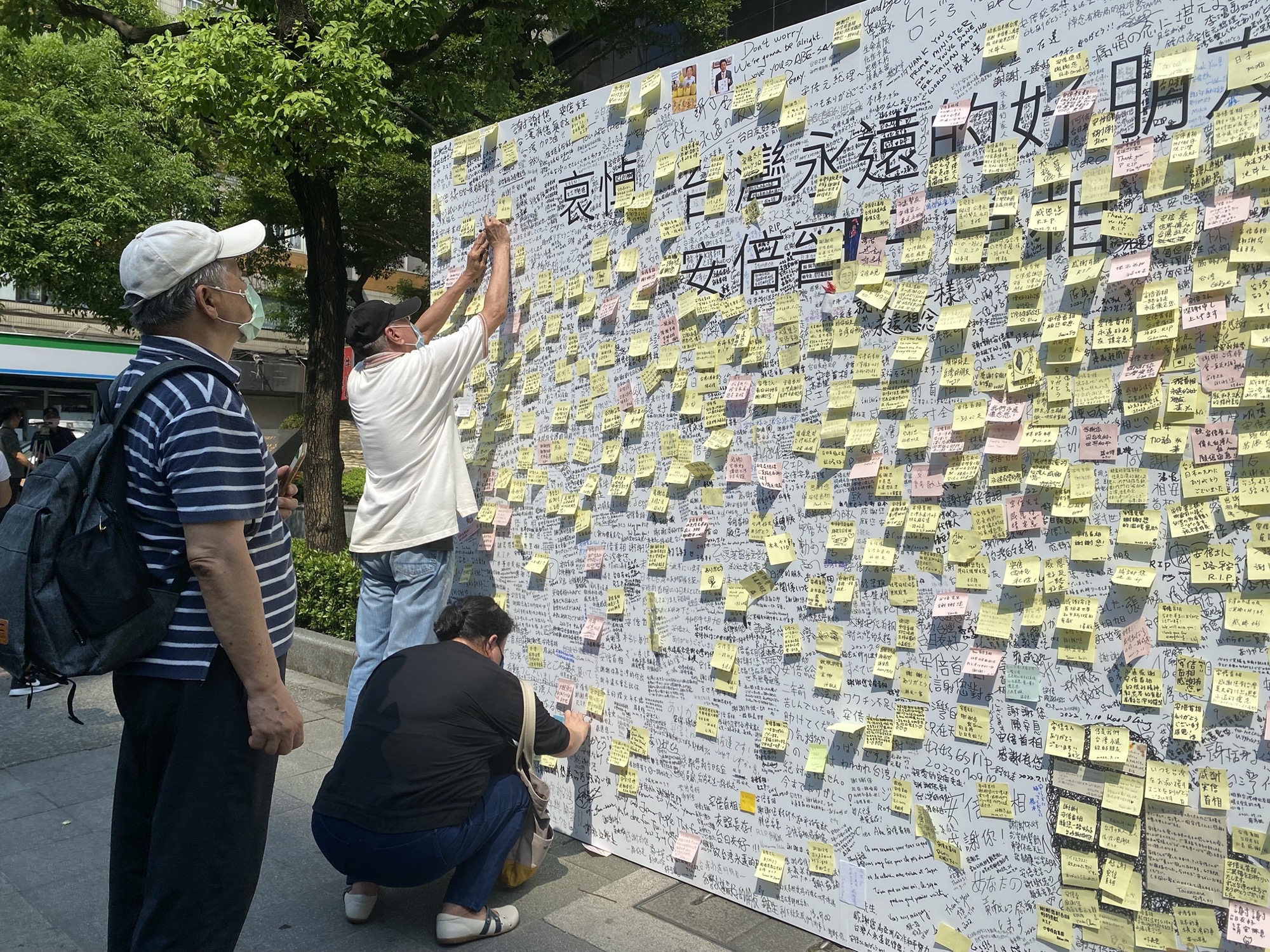In Taiwan, Shinzo Abe remembered as a friend
Former Japanese Prime Minister Shinzo Abe was a vocal supporter of Taiwan and helped strengthen Japan-Taiwan relations. His death on Friday was officially mourned at the highest levels of Taiwan's government.

Even as temperatures reached a steamy 36 degrees, crowds of Taiwanese stood in the blazing sun at the Japan-Taiwan Exchange Association (JTEA) — Japan’s de facto embassy in Taiwan — to write messages of sympathy and support for former Japanese Prime Minister Shinzo Abe, who was fatally shot while delivering a speech in Nara, Japan on Friday.
“Mourning Taiwan’s forever friend, Shinzo Abe,” the top of the board read, with handwritten notes thanking Abe for his friendship with Taiwan. “You are a great statesman and hero,” one note read.

In Taiwan, Abe is remembered as a vocal supporter of Taiwan who helped strengthen Japan-Taiwan relations.
On Friday evening, Taipei’s 101 skyscraper projected messages in tribute to Japan’s longest-serving prime minister. On Monday morning, Republic of China national flags flew at half-mast. Taiwanese officials visited JTEA to formally pay respects, including President Tsai Ing-Wen (蔡英文 Cài Yīngwén) and Foreign Minister Joseph Wu (吳釗燮 Wú Zhāoxiè). According to local media, Vice President Lai Ching-te (賴淸德 Lài Qīngdé) went to Japan to attend Abe’s funeral, making him the highest-level special envoy to visit the country in 50 years.
“Abe Shinzo was my close friend of over a decade, and Taiwan’s most steadfast friend,” Tsai wrote in a social media statement this weekend, calling the assassination “a violent and illegal act.”
After stepping down as prime minister in 2020, Abe reportedly helped facilitate the delivery of much-needed vaccines to Taiwan and promoted Taiwanese pineapples after China banned imports last year. He called for an end to the U.S. policy of strategic ambiguity, instead suggesting a clear commitment to defend Taiwan.
Abe’s administration in 2013 signed the Japan-Taiwan Fishery Agreement after 17 years of negotiations, which allowed both countries to freely fish in waters near the Diaoyutai Islands, which are claimed by China, Taiwan, and Japan. The agreement was seen as a major milestone in Japan-Taiwan relations.
Abe hoped to visit Taiwan and pay tribute to former Taiwan President Lee Teng-hui (李登輝 Lǐ Dēnghuī) after Lee died in 2020. According to local media, the Lee Teng-hui Foundation had planned to invite Abe to Taiwan at the end of this month to give a keynote speech at a forum on Japan-Taiwan relations.
Remembered by many as a right-wing nationalist, Abe sought, but failed, to revise Japan’s Article 9 “peace clause.” His government also sought to rewrite Japan’s World War II history, downplaying its role in the Nanjing Massacre and denying state responsibility for “comfort women.” Abe paid multiple visits to the Yasukuni Shrine, which memorializes Japan’s war dead, including Class A war criminals.
Taiwan’s reaction has been markedly different from mainland China’s, where online reactions to Abe’s death have mostly been unsympathetic. Many of the more nationalistic and uglier comments have since been censored. On Saturday, President Xí Jìnpíng 习近平 expressed “deep regret” over Abe’s death.
“The century-old feud between China and Japan determines it’s impossible to expect Chinese netizens to feel deeply grieved about Abe’s death,” wrote Wang Wen of the Chongyang Institute for Financial Studies at Renmin University of China for the Global Times on Sunday. “It’s even less likely to ask China to express ‘sadness’ by announcing a one-day national mourning as India did or flying the national flag at half-mast as the U.S. did. China will not do so, even if just for putting on a ‘show.’”
The Japanese period in Taiwan is viewed with more sympathy in comparison to the oppressive 30-year Kuomintang period that followed. Taiwanese served in imperial Japan’s army during World War II, where some saw themselves as Japanese; Japan helped modernize much of Taiwan and established critical infrastructure. But forced to assimilate to Japanese culture, many also suffered. Experts estimate that more than 2,000 Taiwanese women were forced into sexual slavery during World War II.
Some commentators, like Brian Hioe of New Bloom Magazine, criticized Taiwan’s “romanticization” of Abe but said it came as no surprise. “Whether Trump or Abe, Taiwan has long idealized right-wing figures so long as they supported Taiwan — even if that was only in the interests of using Taiwan as a wedge issue against China,” he writes.
At JTEA, where Taiwanese wrote messages to the late Abe, one man said he felt it important to show support to Japan after Abe’s consistent support for Taiwan despite growing pressure from China. “To me, this [colonial] history feels very distant,” he said.






